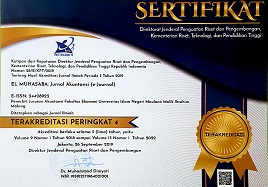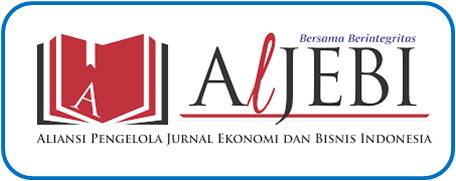ANTESEDEN KEAHLIAN OPERATOR SISTEM PENGELOLAAN ASET DESA DI KABUPATEN SITUBONDO
Abstract
Sistem Pengelolaan Aset Desa (SIPADES) is a village asset administration recording application. This application provides orderly administrative facilities for the village so that the risk of losing assets can be reduced. The purpose of this study is to test and prove various individual aspects that affect operator competence in running SIPADES. The focus of the study is on the internal factors which include anxiety and computer attitudes. Another factor tested was operator training in using SIPADES in the Situbondo District Government. The data used in this study are primary data. The technique of obtaining data using a survey method. The population that is the object of research is all of the operator of the SIPADES application in Situbondo Regency. Four hypotheses were tested using multiple regression. The gender variable was used as the control variable. The results show that all hypotheses can be accepted. The variables of anxiety, attitude, and training have an effect on the operator's competence in operating SIPADES. The implication of the research is that the village government should increase the number of SIPADES operator training. This training can increase competence to run applications.
Keywords
Full Text:
PDFReferences
Achim, N., dan Kassim, A. Al. (2015). Computer Usage: The Impact of Computer Anxiety and Computer Self-efficacy. Procedia - Social and Behavioral Sciences, 172, 701–708. https://doi.org/10.1016/j.sbspro.2015.01.422
Aggorowati, M. A., Iriawan, N., Suhartono, S., dan Gautama, H. (2012). Restructuring and Expanding Technology Acceptance Model Structural Equation Model and Bayesian Approach. American Journal of Applied Sciences, 9(4), 496–504. https://doi.org/10.3844/ajassp.2012.496.504
Al Kurdi, B., Alshurideh, M., Salloum, S. A., Obeidat, Z. M., dan Al-dweeri, R. M. (2020). An Empirical Investigation into Examination of Factors Influencing University Students’ Behavior towards Elearning Acceptance Using SEM Approach. International Journal of Interactive Mobile Technologies (IJIM), 14(02), 19. https://doi.org/10.3991/ijim.v14i02.11115
Alakpodia, O. N. (2014). Gender Differences in Computer Use Skill Among Students of School of Health Technology, Ufuoma, Delta State. International Journal of Digital Library Services, 1142(1998), 1–11.
Alambaigi, A., dan Ahangari, I. (2016). Technology Acceptance Model (TAM) As a Predictor Model for Explaining Agricultural Experts Behavior in Acceptance of ICT. International Journal of Agricultural Management and Development, 6(2), 235–247.
Chen, S. C., Li, S.-H., dan Li, C.-Y. (2011). Recent Related Research in Technology Acceptance Model: A Literature Review. Australian Journal of Business and Management Research, 1(9), 124–127. https://doi.org/10.16194/j.cnki.31-1059/g4.2011.07.016
Di Giacomo, D., Guerra, F., Perilli, E., dan Ranieri, J. (2020). Technophobia as Emerging Risk Factor In Aging: Investigation On Computer Anxiety Dimension. Health Psychology Research, 8(1), 1–4. https://doi.org/10.4081/hpr.2020.8207
Elhai, J. D., Levine, J. C., Dvorak, R. D., dan Hall, B. J. (2016). Fear of Missing Out, Need For Touch, Anxiety and depression are Related To Problematic Smartphone Use. Computers in Human Behavior, 63, 509–516. https://doi.org/10.1016/j.chb.2016.05.079
Firmansyah, A. (2018). Pengelolaan Aset Desa di Kabupaten Tangerang. Jurnal Ilmiah Akuntansi Kesatuan, 6(1), 001–008. https://doi.org/10.37641/jiakes.v6i1.58
Fiyah, N., Mayangky, N. A., Hadianti, S., dan Riana, D. (2019). Analisis Technology Acceptance Model pada Aplikasi Platform Perdagangan Elektronik Di Kalangan Mahasiswa. Jurnal Teknik Informatika, 12(1), 59–68. https://doi.org/10.15408/jti.v12i1.10507
Grupe, D, dan Nitschke, J. (2013). Uncertainty and Anticipation in Anxiety. Nat Rev Neurosci, 14(7), 488–501. https://doi.org/10.1038/jid.2014.371
Grupe, Daniel, dan Nitschke, J. (2013). Uncertainty and Anticipation in Anxiety: An Integrated Neurobiological and Psychological Perspective. Nature Reviews. Neuroscience, 14, 488–501. https://doi.org/10.1038/nrn3524
Gunn, C. (2003). Dominant or different: Gender Issues In Computer Supported Learning. JALN Volume, 7. https://doi.org/10.24059/olj.v7i1.1860
Handayani, R. (2010). Analisis Faktor-Faktor yang Mempengaruhi Penerimaan Penggunaan Personal Computer dengan Teknology Acceptance Model. Riset Manajemen Dan Akuntansi, 1(2010), 55–66.
Harimurti, F., dan Saptantinah Puji Astuti, D. (2017). Pengaruh Computer Anxiety Terhadap Keahlian Pemakai Komputer dengan Internal Locus of Control sebagai Variabel Moderasi. Jurnal Ilmiah Akuntansi Dan Bisnis, 91. https://doi.org/10.24843/jiab.2016.v11.i02.p04
Hoque, M. E., dan Shah, N. U. (2018). Enterprise resource planning system integration and its effects on relationship between lean practices and organisational performances : A conceptual framework. 7(4), 1449–1461.
Hornbæk, K., dan Hertzum, M. (2017). Technology acceptance and user experience: A review of the experiential component in HCI. ACM Transactions on Computer-Human Interaction, 24(5). https://doi.org/10.1145/3127358
Ilmi, M., Setyo Liyundira, F., Rachmawati, A., Juliasari, D., dan Habsari, P. (2020). Perkembangan dan Penerapan Theory Of Acceptance Model (TAM) Di Indonesia. Relasi : Jurnal Ekonomi, 16(2), 436–458. https://doi.org/10.31967/relasi.v16i2.371
Irwandi, I., Andrizal, A., dan Putra, T. D. (2019). Kebijakan Pemerintah Desa dalam Pengelolaan Dana Desa di Kabupaten Muaro Jambi. Jurnal Sains Sosio Humaniora, 3(2), 221–227. https://doi.org/10.22437/jssh.v3i2.8424
John, S. P. (2013). Influence of Computer Self-Efficacy on Information Technology Adoption. Internation Journal of Information Technology, 19(1), 1–13.
Kay, R. (2008). Exploring Gender Differences in Computer-Related Behaviour: Past, Present, and Future. In Social Information Technology: Connecting Society and Cultural Issues (pp. 12–30). https://doi.org/10.4018/978-1-59904-774-4.ch002
Kumar, Sivashanmugam, dan Venkataraman. (2017). Intention To Use Mobile Wallet: Extension of TAM Model. International Journal of Current Engineering and Scientific Research, 4(12), 2393–8374.
Kustono, A. S., dan Valencia, Z. G. (2017). How The Effectiveness Knowledge Sharing Affect Enterprise Resource Planning System Case in East Java—Indonesia. Advanced Science Letters, 23(5), 4295–4297. https://doi.org/10.1166/asl.2017.8263
LaPlant, K. (2015). Why Computer Hardware Skills Are Important in Achieving Academic Success and Improving Retention. Business and Information Technology, 3. Retrieved from www.hennepintech.edu
Lee, Y., Wang, S., Vorlicek M, Surendran, P., Schepard, A. I., Emery, R. E., (2017). Technology Acceptance Model. Business Management and Strategy, 3(1), 121. https://doi.org/10.1007/s10661-014-3885-4
Mannila, L., Nordén, L. Å., dan Pears, A. (2018). Digital competence, Teacher Self-Efficacy and Training Needs. ICER 2018 - Proceedings of the 2018 ACM Conference on International Computing Education Research, 78–85. https://doi.org/10.1145/3230977.3230993
Mastuti, E., dan Handoyo, S. (2019). Computer competency, Test Anxiety, dan Perceived Ease of Use Profile Exploration of High School Students During Computer-Based Testing. North American Journal of Psychology, 21(1), 169–172.
Mehta, A. (2014). Technology Acceptance Of E-Learning Within A Blended Vocational Course in West Africa. Proceedings of the International Conference E-Learning 2014 - Part of the Multi Conference on Computer Science and Information Systems, MCCSIS 2014, (Ajzen 1980), 324–328.
Nanggala, A. Y. A. (2020). Use of Fintech for Payment : Approach to Technology Acceptance Model Modified. Journal of Contemporary Information Technology, Management, and Accounting, 1(1), 1–8.
Nelson, B. D., Hodges, A., Hajcak, G., dan Shankman, S. A. (2015). Anxiety Sensitivity And The Anticipation Of Predictable And Unpredictable Threat: Evidence From The Startle Response And Event-Related Potentials. Journal of Anxiety Disorders, 33, 62–71. https://doi.org/10.1016/j.janxdis.2015.05.003
Njeru, M. N., dan Omondi, M. (2016). Relationship between Total Quality Management and Employee Performance in Public Universities in Kenya: A Case Study of Kirinyaga University College. The Strategic Journal of Business and Change Management, 3(2(21)), 455–483.
Nugraha, A., dan Laksito, H. (2014). Anteseden Penerimaan Teknologi Informasi Dalam Profesi Audit Internal Dengan Menggunakan Technology Acceptance Model (Studi Empiris pada Bank Perkreditan Rakyat di Jawa Tengah). 3(2), 185–199.
Pemdes, D. B. (2018). Modul Pelatihan Sistem Aset Desa. Kementerian Dalam Negeri.
Pujanira, P., dan Taman, A. (2017). Pengaruh Kompetensi Sumber Daya Manusia, Penerapan Standar Akuntansi Pemerintahan, dan Penerapan Sistem Akuntansi Keuangan Daerah Terhadap Kualitas Laporan Keuangan Pemerintah Daerah Provinsi DIY. Nominal, Barometer Riset Akuntansi Dan Manajemen, 6(2). https://doi.org/10.21831/nominal.v6i2.16643
Saade, R., dan Kira, D. (2009). Computer Anxiety in E-Learning: The Effect of Computer Self-Efficacy. Proceedings of the 2009 InSITE Conference, 8. https://doi.org/10.28945/3386
Sabar, S., Masitoh, S., dan Bachri, B. (2018). Development of Computer Learning Materials To Improve Spreadsheet Skills for Training Participants. https://doi.org/10.2991/icei-18.2018.107
Salehipour, A., dan Ah mand, A. (2018). The Impact of Organizational Culture and Performance Work System on Employees’ Performance. International Business Research, 11(6), 199. https://doi.org/10.5539/ibr.v11n6p199
Sanjaya, E. A. (2018). Pengaruh Technology Acceptance Model dan End User Computing Satisfaction terhadap Penerimaan Pengguna Akhir Electronic Data Processing dengan Sikap Sebagai Variabel Mediasi (Studi Kasus di Anugerah Fabric Store Yogyakarta). Thesis. Universitas Sanata Dharma Yogyakarta.
Sasongko, W. P. (2014). Pengaruh Computer self-efficacy, Computer Fear Dan Computer Anticipation terhadap Attitude Toward Computer. Skripsi. Perbanas Surabaya.
Sorgner, A., Bode, E., dan Christiane, K.-B. (2017). The Effects of Digitalization on Gender Equality in the G20 Economies. G20 Insights, (July), 1–167.
Sutaryo, S., dan Nuwandari, I. (2016). Praktik Pengelolaan Aset Desa Di Pemerintahan Desa Provinsi Jawa Tengah. AKRUAL, 7(2), 140–162.
Wang, L. L., Stanovsky, G., Weihs, L., dan Etzioni, O. (2019). Gender Trends in Computer Science Authorship. (June 2018), 1–9. Retrieved from http://arxiv.org/abs/1906.07883
Wulandari, Y. M., Pratomo, S. A., dan Irwanto, W. S. (2016). Pengaruh Persepsi Kebermanfaatan, Kemudahan Penggunaan, Kepuasan Pengguna, Keamanan Dan Kerahasiaan Dan Kenyamanan Wajib Pajak Terhadap Penggunaan E-Filing (Studi Kasus pada Wajib Pajak Orang Pribadi di Kantor Pelayanan Pajak Pratama Klaten). Kiat BISNIS, 6(4). https://doi.org/10.1016/j.pnpbp.2012.06.012
Yusuf, M. O., dan Balogun, M. R. (2020). Student-Teachers’ Competence and Attitude towards Information and Communication Technology: A Case Study in a Nigerian University. Contemporary Educational Technology, 2(1), 18–36. https://doi.org/10.30935/cedtech/6041
Yuwana, A. M., dan Kustono, A. S. (2017). Why is User‟s Expertise Important for Implementation of Regional Asset Information Systems: Case in Indonesia. International Journal of Science and Research (IJSR), 6(7), 377–379. https://doi.org/10.21275/art20175027
DOI: https://doi.org/10.18860/em.v12i1.10192
Refbacks
- There are currently no refbacks.
Editorial Office:
Megawati Soekarnoputri Building
Accounting Department, Faculty of Economics
Jln. Gajayana 50 Telp (0341) 558881
E-mail: elmuhasaba@uin-malang.ac.id
Universitas Islam Negeri Maulana Malik Ibrahim Malang
E-ISSN 2442-8922
P-ISSN 2086-1249

This work is licensed under a CC BY SA 4.0 International License

















